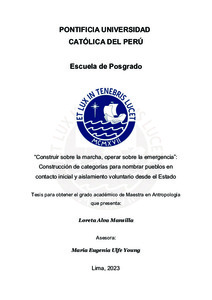| dc.contributor.advisor | Ulfe Young, María Eugenia | |
| dc.contributor.author | Alva Mansilla, Loreta | |
| dc.date.accessioned | 2024-01-12T20:54:28Z | |
| dc.date.available | 2024-01-12T20:54:28Z | |
| dc.date.created | 2023 | |
| dc.date.issued | 2024-01-12 | |
| dc.identifier.uri | http://hdl.handle.net/20.500.12404/26789 | |
| dc.description.abstract | Esta tesis se enfoca en cómo el Estado y las personas que lo conforman
construyen categorías para nombrar y clasificar a pueblos originarios en una situación
especial, la de contacto inicial y aislamiento voluntario. Determinar y delimitar los
términos de contacto y aislamiento resulta bastante problemático, en tanto la realidad
no se alinea con la lógica que el Estado implanta en su función de gobernar y administrar
una población. Debido a ello, esta investigación, analiza mediante un lente etnográfico
los desencuentros del Estado con el territorio que administra, expresados en las
tensiones que existen entre el discurso de quienes ejercen la lógica estatal y las lógicas
de a quienes sirve. A través del análisis de documentos oficiales y de las entrevistas con
funcionarios y funcionarias e investigadores, esta tesis se propone averiguar cómo la
denominación y clasificación de la población en contacto inicial y aislamiento voluntario
se torna un ejercicio de poder desde el Estado, a través de la construcción de las
categorías, y cómo, a través de discursos y prácticas las personas que diseñan y
construyen estas categorías construyen representaciones sobre estos sujetos Dichas
representaciones y la negociación de las categorías que las componen terminan
conformando una escala más en la gobernabilidad implementada desde arriba que
puede afectar la vida cotidiana y el acceso a derechos básicos de los sujetos
categorizados. Por ello, el propósito de esta tesis es estudiar, no a los pueblos en
contacto inicial (PICI), sujetos de innumerables trabajos antropológicos, sino a quienes
trabajan analizando, investigando, construyendo e instalando este tipo de políticas y
servicios | es_ES |
| dc.description.abstract | This thesis analyzes how the State and the people who work for it (civil servants and
researchers) construct categories to name and classify indigenous peoples in a special
situation, the isolated indigenous people who are in a situation of initial contact or/and
“voluntary isolation” in the Peruvian Amazon. Determining and delimiting the terms of
contact and isolation is quite problematic, as reality does not align with the logic that the
State implements in its function of governing and administering a population. Due to this,
this research analyzes, through an ethnographic lens, the disagreements between the
State and the people it administers, with the focus put up to the tensions that exist
between the discourse of those who exercise the State logic and the logics of the people
to whom it serves. Through the analysis of official documents and interviews with civil
servants and researchers, this thesis aims to find out how the classification of the
population in initial contact and voluntary isolation becomes an exercise of power by the
State, through the construction of the categories, and how the people who design and
construct these categories build representations about these subjects, through
discourses and practices. These representations and the negotiation of the categories
that compose them end up forming another scale in the governance implemented from
above that can affect the daily life and the access to basic rights of the categorized
subjects. Therefore, the purpose of this thesis is to study, not the people in initial contact
(PICI, in spanish) who had been subjects of countless anthropological works, but those
who work analyzing, researching, building and installing this type of policies and service,
in an effort to shed light on how the Peruvian State works and classifies ethnicity. | es_ES |
| dc.language.iso | spa | es_ES |
| dc.publisher | Pontificia Universidad Católica del Perú | es_ES |
| dc.rights | info:eu-repo/semantics/openAccess | es_ES |
| dc.rights.uri | http://creativecommons.org/licenses/by/2.5/pe/ | * |
| dc.subject | Pueblos indígenas--Relaciones gubernamentales--Perú | es_ES |
| dc.subject | Pueblos indígenas--Asimilación cultural--Perú | es_ES |
| dc.subject | Nombres etnológicos--Perú | es_ES |
| dc.subject | Administración pública--Perú | es_ES |
| dc.subject | Análisis crítico del discurso | es_ES |
| dc.title | Construir sobre la marcha, operar sobre la emergencia : Construcción de categorías para nombrar pueblos en contacto inicial y aislamiento voluntario desde el Estado | es_ES |
| dc.type | info:eu-repo/semantics/masterThesis | es_ES |
| thesis.degree.name | Maestro en Antropología | es_ES |
| thesis.degree.level | Maestría | es_ES |
| thesis.degree.grantor | Pontificia Universidad Católica del Perú. Escuela de Posgrado. | es_ES |
| thesis.degree.discipline | Antropología | es_ES |
| renati.advisor.dni | 07871124 | |
| renati.advisor.orcid | https://orcid.org/0000-0002-2749-1036 | es_ES |
| renati.author.dni | 46097360 | |
| renati.discipline | 315017 | es_ES |
| renati.juror | Ames Ramello, Patricia Paola | es_ES |
| renati.juror | Ulfe Young, María Eugenia | es_ES |
| renati.juror | Salas Carreño, Guillermo | es_ES |
| renati.level | https://purl.org/pe-repo/renati/level#maestro | es_ES |
| renati.type | https://purl.org/pe-repo/renati/type#tesis | es_ES |
| dc.publisher.country | PE | es_ES |
| dc.subject.ocde | https://purl.org/pe-repo/ocde/ford#5.04.03 | es_ES |







